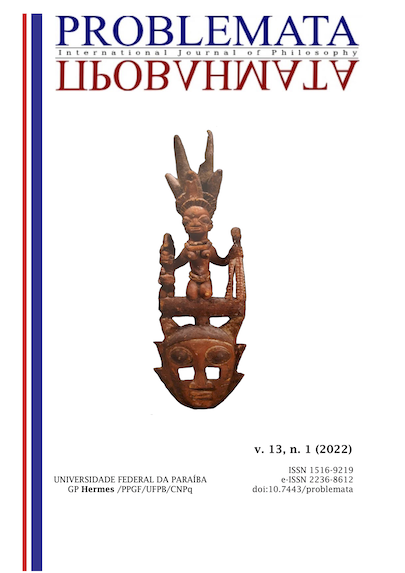BLACK PERFORMATIVITIES IN THE PHILOSOPHY OF YORUBÁ ART:
CONNECTIONS BETWEEN GÈLÈDÉ, OLOJÓ FESTIVAL AND AFRO-BRAZILIAN CULTURAL MANIFESTATIONS
DOI:
https://doi.org/10.7443/problemata.v13i1.63177Keywords:
Festival Gèlèdè, Olojo Festival, Aesthetic Connections, Amerindian Manifestations, African PhilosophyAbstract
This research was developed to think about the aesthetic connections between Yorubaland and Brazil from the shows Gèlèdé, the Olojó Festival in Africa and the Afro-Amerindian cultural manifestations, focusing on issues that involve materialities, relationships with natural, historical and social events. , associated with a peculiar thought about the conceptions of the sacred, listed as foundations of the constitutive processes of such events, which reflect experiences and cosmo perceptions that formulate the subjectivities of a people descendant of Africa, verified in the activities of the communities from which they originate, as well as their apprentices. Associated with the rebellious and playful mystique of Exu, the diasporic manifestations refer to new possibilities of ordering a reality now marked by colonial processes. These, represented through laughter, promote in their comics the possibility of ways of living, through a critical perception of reality, becoming a primeval element of a devotional and propositional aesthetics of new and reformulated views on life.
Downloads
References
AMIRA, Lhola. .Conversas Entrevista a Wura-Natasha Ogunji. Catálogo 33ª Bienal de São Paulo. p. 316 - 318. São Paulo, 2018. Disponível em: https://issuu.com/bienal/docs/33bsp-catalogo-pt . Acesso em 12/06/2022.
BARRETO, Tainá Dias de Moraes. Tem Mulher Na Brincadeira? Falas Femininas, Corpo E Dança Na Tradição Do Cavalo Marinho Pernambucano. Revista Linha Mestra, n. 39, p. 19-30, set/dez de 2019 . Disponível em: https://lm.alb.org.br/index.php/lm/article/view/312/341 . Acesso em 12/06/2022.
BLIER, Suzanne Preston. Art and risk in ancient Yoruba: Ife history, power, and identity, c. 1300. Suzanne Preston Blier. United Kigdom: Cambridge University Press, 2015.
BROCHADO, Izabela C. O Mamulengo e as Tradições Africanas de Teatro de Bonecos. Izabela Brochado. Móin Móin. Revista de Estudos sobre Teatro de Formas Animadas. v.2, p. 138-155. Brasília: Universidade de Brasília (UnB), 2006.
DAMATTA, Roberto. O carnaval como um rito de passagem. Roberto Damatta. In: Ensaios de antropologia estrutural.- Petrópolis: Vozes, 1973.
DREWAL, Henry John et al. Gẹlẹdẹ: Art and female power among the Yoruba. Henry John Drewal e Margareth Thompson Drewal. - Bloomington e Indianapolis: Indiana University Press, 1983.
EUGENIO, Naiara Paula. Estética e Filosofia da Arte Africana. Problemata: Revista Internacional de Filosofía, v. 11, n. 2, p. 112-123, 2020. Disponível em: https://periodicos.ufpb.br/index.php/problemata/article/view/53634/30947. Acesso em 15 de Junho de 2022.
GANDRA, Alana. Hábito de homens se fantasiarem de mulher no carnaval é um ritual de inversão. Alana Gandra. Agência Brasil, 02 de Março de 2014. Disponível em: https://agenciabrasil.ebc.com.br/cultura/noticia/2014-03/habito-de-homens-se-fantasiarem-de-mulher-no-carnaval-e-um-ritual-da, acesso em 26 de Maio de 2022.
GONZALEZ, Lélia. A categoria político-cultural de amefricanidade. Tempo Brasileiro, Rio de Janeiro, v. 92, n. 93, p. 69-82, (jan./jun.), 1988b, p. 69-82.
LAWAL, Babatunde. The Gẹ̀lẹ̀dé spectacle: art, gender, and social harmony in an African culture. Babatunde Lawal. - Seattle e Londres: University of Washington Press, 1996.
LOPES, Vitor. Anchieta (ES) - o mar responde. Vitor Lopes. - Site Overmundo, 05 de Julho de 2007. Disponível em: http://www.overmundo.com.br/overblog/anchieta-es-o-mar-responde, acesso em 26 de Maio de 2022.
MR. TARRISON. Gelede Ceremony, Nr Cove, Benin, YouTube, 23 de Out. 2017. Disponível em: https://www.youtube.com/watch?v=MvhNX8-rGeY, acesso em 26 de Maio de 2022.
NOBLES. Wade. Sakhu Sheti: retomando e reapropriando um foco psicológico afrocentrado. Wade Nobles. In: NASCIMENTO, E. L. (Org.) Afrocentricidade: uma abordagem epistemológica inovadora. São Paulo: Selo Negro, 2009.
PAULA, Naiara; WER, Claudia. Filosofia Africana: um estudo sobre a conexão entre ética e estética. Voluntas: Revista Internacional de Filosofia, v. 10, p. 128-138, 2019. Disponível em: https://periodicos.ufsm.br/voluntas/article/view/39890/21266. Acesso em 15 de Junho de 2022.
SÀLÁMÌ, Síkírù (King);. Exu e a ordem do universo. Síkù Sàlámì e Ronilda Iakemi Ribeiro. - 2. Ed. São Paulo: Oduduwa, 2015.
SOUSA, Jamilson Oliveira de. As caretas e o nego fugido fazem a festa em Acupe: Estudos interdisciplinares sobre a cultura popular, a tradição e a educação nas performances sociais que fazem a festa em Acupe. UFBA. 2014. Disponível em https://repositorio.ufba.br/bitstream/ri/17487/1/Jamilson%20Sousa.pdf. Acesso em 12/06/2022 .
SOUZA, Roberta. Os Mestres do Reisado Cearense saem às ruas mais um Dia de Reis. 05/jan/2020. Fotografia de Fabiane de Paula. Disponível em https://diariodonordeste.verdesmares.com.br/verso/mestres-do-reisado-cearense-saem-as-ruas-em-mais-um-dia-de-reis-1.2194375 . Acesso em 11/06/2022.
THE BRITISH LIBRARY. Extract from ‘Gèlèdé: A Yoruba masquerade’. YouTube, 29 de Fevereiro de 2016. Disponível em: https://www.youtube.com/watch?v=afUTAx_EG14. Acesso em 26 de Maio de 2022.
UNESCO. The Oral Heritage of Gelede. YouTube, 26 de Setembro de 2009. Disponível em:
https://www.youtube.com/watch?v=ycSMt0bjE1c, acesso em: 26 de Maio de 2022.
Downloads
Published
Issue
Section
License
Copyright (c) 2022 Naiara Paula Eugênio, Glauce Regina Assis de Paula

This work is licensed under a Creative Commons Attribution 4.0 International License.
Authors who publish with this journal agree to the following terms:
- Authors retain copyright and grant the journal right of first publication with the work simultaneously licensed under a Creative Commons Attribution License that allows others to share the work with an acknowledgement of the work's authorship and initial publication in this journal.
- Authors are able to enter into separate, additional contractual arrangements for the non-exclusive distribution of the journal's published version of the work (e.g., post it to an institutional repository or publish it in a book), with an acknowledgement of its initial publication in this journal.
-
- Authors are permitted and encouraged to post their work online (e.g., in institutional repositories or on their website) prior to and during the submission process, as it can lead to productive exchanges, as well as earlier and greater citation of published work (See The Effect of Open Access).





